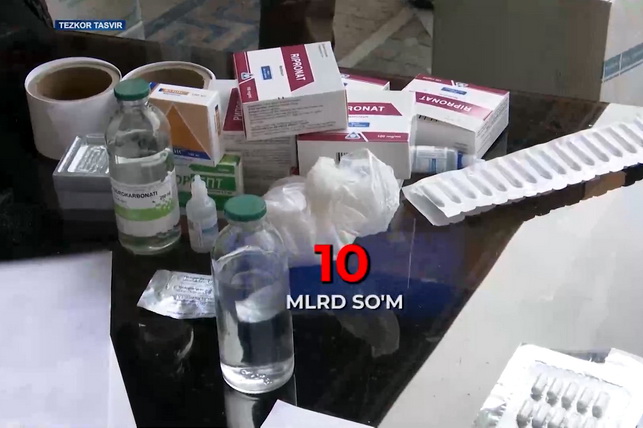
Nearly 600,000 units of counterfeit medicines worth 10 billion soums seized in Uzbekistan
Nearly 600,000 units of counterfeit medicines worth 10 billion soums seized in Uzbekistan
Tashkent, Uzbekistan (UzDaily.com) — A clandestine workshop producing and distributing counterfeit pharmaceuticals was shut down in Tashkent and the Tashkent region, according to a statement from Uzbekistan’s State Security Service (SSS).
During joint operations conducted by SSS officers and customs authorities, it was established that a 1984-born citizen residing in Tashkent had rented premises in the Tashkent district of the Tashkent region. A search of the premises, carried out in the presence of witnesses, revealed that the suspect was not only producing counterfeit drugs but also engaged in their illegal sale.
In the underground facility, which had been set up for the production of pharmaceuticals, a total of 594,127 units of counterfeit medicine across 49 different brands were discovered. These included drugs such as Fucis, Prosulpin, Ursosan, Arbidol, and others. None of the products had proper documentation or met safety standards. The medicines were manufactured in makeshift conditions using 50 pieces of equipment, including machines and molds. Authorities also seized 168 kg of raw materials, labels, instruction leaflets, cardboard packaging, empty containers, and capsules used in the production process.
A search of another premises owned by the suspect, located in Tashkent’s Uchtepa district, uncovered 28,640 units of two types of medical products, 75 ampoules, 46 containers with liquid, labels for 26 types of various medications, as well as 18,280 unmarked suppositories, 40 capsules, and empty pharmaceutical packaging. All of these items were seized as material evidence.
Preliminary investigation revealed that the organizer of the illegal manufacturing operation had sourced raw materials online from unidentified individuals.
The total value of the seized goods and equipment is estimated at nearly 10 billion soums. Authorities noted that the counterfeit drugs had been distributed to pharmacies in Tashkent and the Bukhara region, and thanks to the timely operation, further circulation was prevented.
The organizer has been formally charged under Part 3 of Article 186(3) of Uzbekistan’s Criminal Code, and an investigation is ongoing.
As part of the broader operation, conducted in cooperation with the Department for Combating Economic Crimes, a 1992-born citizen from Tashkent and his accomplice — a 1996-born employee of a local bank — were also detained. They were caught attempting to sell 798 boxes containing 574,560 infusion systems imported from China for US$55,700. These goods were seized as evidence.
An expert examination concluded that the seized medical products, valued at around 1 billion soums, were unfit for use and have been banned from storage, sale, transport, or application in medical practice within Uzbekistan.
Criminal proceedings have also been initiated against these individuals under Part 3 of Article 186(3) of the Criminal Code, and investigations are ongoing.